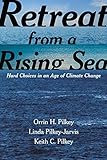Retreat from a Rising Sea : Hard Choices in an Age of Climate Change / Linda Pilkey-Jarvis, Orrin H. Pilkey, Keith C. Pilkey.
Material type: TextPublisher: New York, NY : Columbia University Press, [2016]Copyright date: ©2016Description: 1 online resource (240 p.) : 32 color illustrationsContent type:
TextPublisher: New York, NY : Columbia University Press, [2016]Copyright date: ©2016Description: 1 online resource (240 p.) : 32 color illustrationsContent type: - 9780231168441
- 9780231541800
- 333.917 23
- TC330 .P55 2016
- TC330 .P55 2017
- online - DeGruyter
- Issued also in print.
| Item type | Current library | Call number | URL | Status | Notes | Barcode | |
|---|---|---|---|---|---|---|---|
 eBook
eBook
|
Biblioteca "Angelicum" Pont. Univ. S.Tommaso d'Aquino Nuvola online | online - DeGruyter (Browse shelf(Opens below)) | Online access | Not for loan (Accesso limitato) | Accesso per gli utenti autorizzati / Access for authorized users | (dgr)9780231541800 |
Frontmatter -- Contents -- Foreword -- Preface -- Acknowledgments -- 1. Control + Alt + Retreat -- 2. The Overflowing Ocean -- 3. The Fate of Two Doomed Cities: Miami and New Orleans -- 4 New and Old Amsterdam: New York City and the Netherlands -- 5. Cities on the Brink -- 6. The Taxpayers and the Beach House -- 7. Coastal Calamities: How Geology Affects the Fate of the Shoreline -- 8. Drowning in Place: Infrastructure and Landmarks in the Age of Sea-Level Rise -- 9. The Cruelest Wave: Climate Refugees -- 10. Deny, Debate, and Delay -- 11. Ghosts of the Past, Promise of the Future -- Bibliography -- Index
restricted access online access with authorization star
http://purl.org/coar/access_right/c_16ec
Melting ice sheets and warming oceans are causing the seas to rise. By the end of this century, hundreds of millions of people living at low elevations along coasts will be forced to retreat to higher and safer ground. Because of sea-level rise, major storms will inundate areas farther inland and will lay waste to critical infrastructure, such as water-treatment and energy facilities, creating vast, irreversible pollution by decimating landfills and toxic-waste sites. This big-picture, policy-oriented book explains in gripping terms what rising oceans will do to coastal cities and the drastic actions we must take now to remove vulnerable populations.The authors detail specific threats faced by Miami, New Orleans, New York, and Amsterdam. Aware of the overwhelming social, political, and economic challenges that would accompany effective action, they consider the burden to the taxpayer and the logistics of moving landmarks and infrastructure, including toxic-waste sites. They also show readers the alternative: thousands of environmental refugees, with no legitimate means to regain what they have lost. The authors conclude with effective approaches for addressing climate-change denialism and powerful arguments for reforming U.S. federal coastal management policies.
Issued also in print.
Mode of access: Internet via World Wide Web.
In English.
Description based on online resource; title from PDF title page (publisher's Web site, viewed 02. Mrz 2022)


